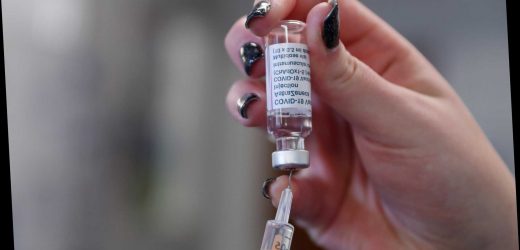THERE have been five reports of a specific brain blood clot in people who had had the AstraZeneca coronavirus vaccine in the UK.
However, no link has been made with the jab at this stage, the medicines regulator has said, urging Brits to take the jab if offered.
? Read our coronavirus live blog for the latest news & updates…
The five people were men aged 19 to 59 who experienced a clot together with low blood platelet count.
The Medicines and Healthcare products Regulatory Agency (MHRA) said it was looking at the reports but stressed the events were “extremely rare”.
Dr Phil Bryan, MHRA vaccine safety lead, said there was a “one in a million” chance of suffering this type of clot, based roughly on the fact that there had been at least 10 million AZ vaccines given in the UK.
Professor Sir Munir Pirmohamed, chairman of the expert working group of the Independent Commission on Human Medicines, said the risk of dying from Covid in those in their 40s was one in 1,000.
And there was a possibility the blood clots could have been caused by Covid itself.
He said if it was discovered that the vaccine had been the cause, it would not make it necessary to stop giving the life-saving jabs.
It comes after 20 European nations paused use of the vaccine in the past week over blood clot concerns, despite the World Health Organization and EU regulators advising against the move.
MHRA FINDINGS
The MHRA and experts have conducted a “very detailed review” of reports through the yellow card scheme, GP and hospital records.
Dr Bryan said: “We have received five reports of what is a very unique, specific form of blood clots in the cerebral vein, known as sinus vein thrombosis, concurrent with low blood platelets, which can cause bleeds.
“These are after the AstraZeneca vaccine.
“What we don't know is whether these cases have been caused by the vaccine. We are working closely with experts to try and gather more information to determine this, because these illnesses do very rarely happen naturally.
“This is extremely rare. So far, less than one in a million cases of this particular event after vaccination.”
He said the cases were similar to some of the cases that have been reported in Europe in the past week or so.
Dr Bryan added that there was “no proven” link with the rare medical event and the AstraZeneca vaccine.
“What we do know are these are highly effective vaccines, and we still have a huge burden of covid disease in the population.
“Right now, the balance of benefits and known risks of the vaccine are favourable.”
The data also showed there had been two cases of a blood clot in the brain, called cerebral venous sinus thrombosis (CVST), in two people who had been given the Pfizer vaccine.
One patient, an elderly person, died.
But for both vaccines, rates of venous thromboembolism – a blood clot in the veins such as a DVT in the leg – are “not occuring at a greater frequency after either vaccine than the rates in an unvaccinated population”.
Dr June Raine, MHRA chief executive, said: “We continually monitor safety during use of all vaccines to protect the public, and to ensure the benefits continue to outweigh the risks.
“Our thorough and careful review, alongside the critical assessment of leading, independent scientists, shows that there is no evidence that that blood clots in veins is occurring more than would be expected in the absence of vaccination, for either vaccine (Pfizer or AstraZeneca).
“We have received a very small number of reports of an extremely rare form of blood clot in the cerebral veins…occurring together with lowered platelets soon after vaccination.
"The benefits of the vaccine in preventing Covid-19, with its associated risk of hospitalisation and death, continue to outweigh the risks of potential side effects.
“You should therefore continue to get your jab when it is your turn.”
RARE CONDITION
The five unusual cases combine two conditions – cerebral venous sinus thrombosis (CVST) and thrombocytopenia.
In CVST, a blood clot blocks a vein in the brain that drains blood. It is a form of stroke.
According to John Hopskins Medicine, it affects about five in one million people each year.
The second condition is thrombocytopenia – a condition characterized by abnormally low levels of platelets.
It’s not clear how many people this usually affects.
Dr Bryan said there was an issue with working out how common the combination of CVST and thrombocytopenia occurred because it is so rare.
Sir Munir said the event “can occur naturally and have been reported with Covid infection”.
He said: “Platelets go down in about 37 per cent of people affected by Covid, and there have been reports of venous thrombosis occurring in the cerebral veins associated with Covid.
“What we are doing is working with expert hematologists to get more information on those rare cases, so we can actually understand if there is any kind of causal link associated with the vaccine, or if it is related to previous covid infection.”
“We still recommend the vaccine is taken when you are offered it.”
Sir Munir said “much more information” on cases was needed to decide if there was a “causal link”.
He added: “Overall, I don't think that would necessitate pause to any kind of vaccination programme… If this is one in a million, if it's that low, the risk of dying of Covid even in your 40s is much higher, it's about one in 1,000 in your 40s.
“So the overall benefit far exceeds any risk, if a causal link is established.”
CASES IN EUROPE
It comes after Germany reported it had seen seven cases of CVST in 1.6 million people who had recently had the vaccine, three of which ended in death.
There has been no conclusive link made with the jab itself.
The Paul Ehrlich Institute, German’s health regulator, said it had recommended the temporary suspension of the vaccine following a “noticeable increase” in CVST.
The EMA is carefully examining each case to look for possible contributing factors, reporting on March 15 there had been “blood clots with some with unusual features such as low numbers of platelets in a very small number of people who received the vaccine”.
However, having looked at data so far, EU regulators said they still believed the benefits of vaccinating people against Covid outweigh the risks.
Emer Cooke, executive director, said on Tuesday there is currently “no indication” the blood clots were the result of a vaccine, with further information to be reported on Thursday.
Professor Jeremy Brown from the JCVI said Germany was concerned about a specific blood clot that “affects the vein that runs run down the middle of the brain”.
He told BBC Radio 4’s Today programme: “This is an incredibly rare event that occurs spontaneously in a small number of people each year.
“And this blood clot also occurs as a complication of actually acute Covid infection very rarely as well, so that will probably increase the background rate of this happening, so I think the concerns about this blood clot are overblown by the Germans.
“I don’t see it being likely to be linked to the vaccine either mechanistically, or the numbers involved are so low it seems very unlikely that there’s much increased risk, if any increased risk, with the vaccine at all.”
Source: Read Full Article




